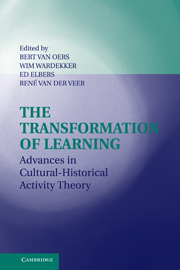Book contents
- Frontmatter
- Contents
- List of Contributors
- Preface
- INTRODUCTION
- SECTION ONE TENETS OF ACTIVITY THEORY
- SECTION TWO IDENTITY, DIVERSITY, AND INCLUSION
- Introduction to Section Two: Identity, Diversity, and Inclusion
- 9 Identity Shifts in Informal Learning Trajectories
- 10 No Human Being Is Illegal: Counteridentities in a Community of Undocumented Mexican Immigrants and Children
- 11 Cultural Identity and Emigration: A Study of the Construction of Discourse about Identity from Historical-Cultural Psychology
- 12 Diversity in the Construction of Modes of Collaboration in Multiethnic Classrooms: Continuity and Discontinuity of Cultural Scripts
- 13 “Discourse” in Cultural-Historical Perspective: Critical Discourse Analysis, CHAT, and the Study of Social Change
- 14 Reason and Dialogue in Education
- SECTION THREE DYNAMICS OF ACTIVITY AND THE VARIATIONS OF LEARNING
- Index
- References
13 - “Discourse” in Cultural-Historical Perspective: Critical Discourse Analysis, CHAT, and the Study of Social Change
Published online by Cambridge University Press: 25 August 2009
- Frontmatter
- Contents
- List of Contributors
- Preface
- INTRODUCTION
- SECTION ONE TENETS OF ACTIVITY THEORY
- SECTION TWO IDENTITY, DIVERSITY, AND INCLUSION
- Introduction to Section Two: Identity, Diversity, and Inclusion
- 9 Identity Shifts in Informal Learning Trajectories
- 10 No Human Being Is Illegal: Counteridentities in a Community of Undocumented Mexican Immigrants and Children
- 11 Cultural Identity and Emigration: A Study of the Construction of Discourse about Identity from Historical-Cultural Psychology
- 12 Diversity in the Construction of Modes of Collaboration in Multiethnic Classrooms: Continuity and Discontinuity of Cultural Scripts
- 13 “Discourse” in Cultural-Historical Perspective: Critical Discourse Analysis, CHAT, and the Study of Social Change
- 14 Reason and Dialogue in Education
- SECTION THREE DYNAMICS OF ACTIVITY AND THE VARIATIONS OF LEARNING
- Index
- References
Summary
What part does discourse play in significant social events and processes of social change? This question is very important for social scientists in general, but it seems particularly significant for the cultural-historical tradition. Cultural-historical activity theory (CHAT) is, after all, profoundly marked by discussions about the importance of “semiotic mediation,” and of linguistic mediation in particular, in the development of human communities. Yet, in terms of seeking to address the role of language use in processes of social change, it seems that the cultural-historical tradition has lagged behind other schools of social science. Perhaps then, it might be suggested, cultural-historical researchers should be looking to learn from these other schools and to use their tools and insights. The principal school that might come to mind here is the school of critical linguistics and critical discourse analysis (CL-CDA), originating in the work of Roger Fowler and his colleagues at the University of East Anglia in the later 1970s, and represented today in particular by the well-known works of Norman Fairclough (esp. 1989, 1992, 1995, 2000, 2001). Yet, as contributors such as Jones (2004) and Engeström (1999a) have argued, and as I have argued myself elsewhere (Collins, 1999), close scrutiny of the CL-CDA tradition in general, and the work of Fairclough in particular, reveals serious difficulties with the idea of complementing CHAT with CDA.
Perhaps, then, CHAT researchers might seek instead to build more effectively on the bases to be found within the CHAT tradition itself.
Information
- Type
- Chapter
- Information
- The Transformation of LearningAdvances in Cultural-Historical Activity Theory, pp. 242 - 272Publisher: Cambridge University PressPrint publication year: 2008
References
Accessibility standard: Unknown
Why this information is here
This section outlines the accessibility features of this content - including support for screen readers, full keyboard navigation and high-contrast display options. This may not be relevant for you.Accessibility Information
- 4
- Cited by
